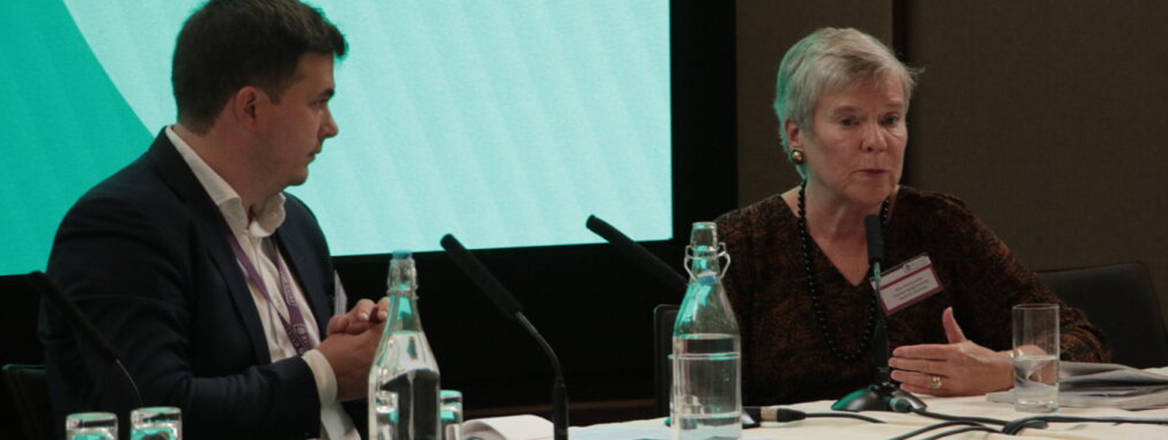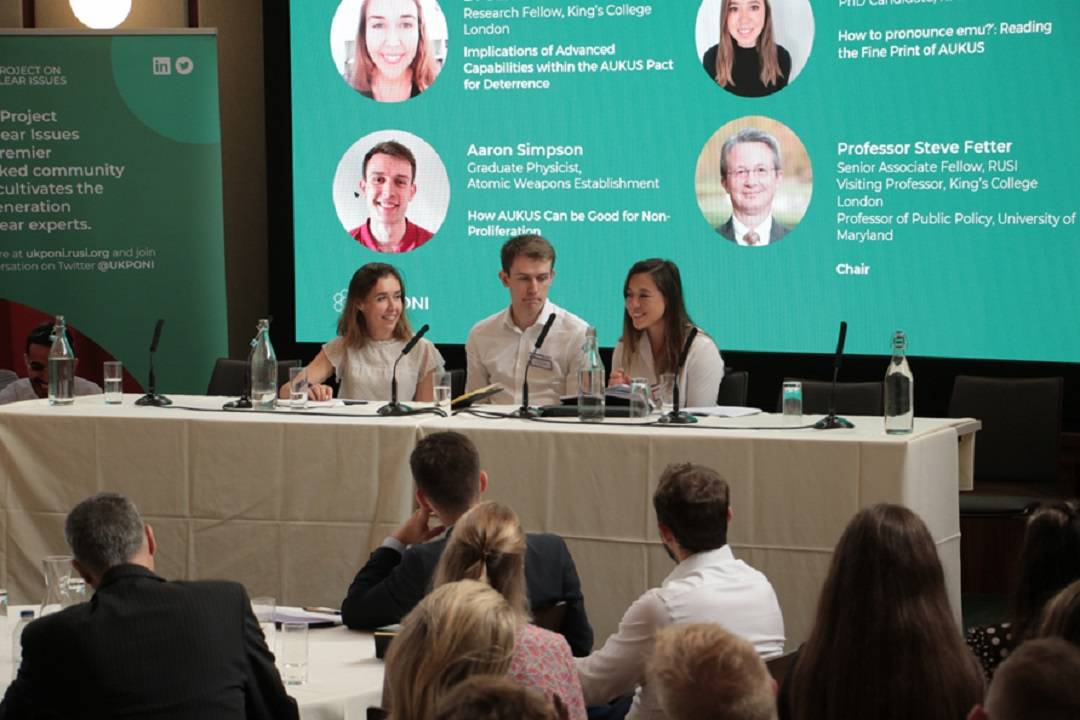‘Endlessly Fascinating’: Reflections on a US Career in Nuclear Issues
At the 2023 UK PONI Conference – RUSI’s flagship annual gathering on nuclear matters, bringing together early career professionals alongside more established experts – The Hon. Rose Gottemoeller reflected on her distinguished career, as well as contemporary nuclear issues.
Matthew Harries (MH): You say very early on in your book that in 1977 you were a Russian linguist at a satellite ground station in Maryland. How did you end up there?
Rose Gottemoeller (RG): This was the first modernisation of the US-Soviet ‘hotline’, which started out after the Cuban Missile Crisis in 1962. It was originally a ground line, and it ran, for example, through farmland in Finland. Finnish farmers kept cutting through the hotline! So, at some point, the US and the USSR agreed on a number of modernisations. We were using two satellite constellations: a US satellite constellation, and Soviet Molniya satellites on polar orbits. There was a ground station at Fort Detrick in Maryland, and it was my job, every six hours as the satellites handed off, to make sure we were still in touch with the Soviet team at their ground station near Moscow. Thankfully, nuclear war doesn't happen very often, so it was the most boring job I'd ever had at that point!
MH: And your gateway into the US government was an International Affairs Fellowship at the Council on Foreign Relations.
RG: I'd been working at RAND for about a decade, and at that point I was ready to try something different. The International Affairs Fellowships take people from the academic or think tank community and give them a chance to go into government for a year, while also taking people from government and giving them a chance to go into think tanks or academia.
I had the chance to work on what in those days was the Soviet desk, although by the end of the year we were calling it the union of fewer and fewer Soviet Socialist republics! This was a period when the Soviet Union was breaking apart, and there was a lot of upheaval. But I had the opportunity there to go to work as a very junior representative of the State Department on the Strategic Arms Reduction Treaty (START) negotiations that were taking place in Geneva. It was a great opportunity for me to learn.
MH: In your book about the New START negotiations, some of the passages I found most interesting were about the dynamics of your own delegation, and your interactions not just with the Russians but also with the White House. I will just tease this so that people go and buy the book, but there are some very interesting bits about you receiving dressing-downs via video call and thinking you were going to lose your position. You also discuss the fact that you were the first woman to lead a major arms control treaty negotiation. And you were also the first woman to be deputy secretary-general of NATO. What advice do you have for women in the field now at an early stage in their career? And how would you compare the early stages of your career as a woman in this field to what people might be encountering now?
RG: That's a sore subject, to be honest, because sometimes I think the more things change, the more they remain the same. But you know, when I first came to the International Institute for Strategic Studies in the UK back in 1985, I would not have seen a room like I am seeing now at RUSI, with half the participants being women. That is a really good thing, and there's a lot of talent – both men and women – around this room today. So that has definitely gotten better.
MH: Moving to the subjects we’ve been discussing at this conference: as a Russian speaker, and as someone who's negotiated with Russians and continues to be involved in academic dialogues and exchanges, I have to ask you about the way that Russian officials and people close to the Russian government have talked about nuclear weapons during the war in Ukraine. As someone who has deep experience with these people, how do you interpret the role they are playing in that conversation? How much is it coordinated? What is the message they're trying to send, and what should we do about it?
RG: I reflect on it with deep sorrow, because even during the depths of the Cold War, there was a profound discipline among the Soviet elite about how nuclear weapons were treated, how nuclear weapons issues were articulated to the public, and how their deterrence messaging worked. It was a very careful and generally well calibrated strategy that held throughout the years of the Cold War and into the first 25 years or so of this era. That discipline has broken down on the back of the notion that rattling the nuclear sabre will somehow buy an advantage. Whether that is a deterrence advantage, I don’t know – it seems to be meant as a kind of political move on the international stage to drive forward agenda items that are much lesser, in a way, than the threat of nuclear holocaust.
There is beginning to be commentary in the Russian media about how red lines have been crossed again and again during this war, and they haven't responded adequately
I don't understand Vladimir Putin's aggression against Ukraine. I think it was a horrible act from the outset, and I don't know what was going on in his mind. I do know he was quite isolated during the pandemic, and that seems to have led to certain kinds of behaviour. But then to rattle the nuclear sabre in the way he and his compatriots have been doing is the height of irresponsibility, in my view. Again, it's a deep contrast with the serious discipline with which these issues were treated by the Soviet Politburo and the Central Committee during the Cold War.
I do think that something is seriously amiss, if only because it undermines their deterrence messaging. At the end of the day, there's an element of the boy crying wolf. There is beginning to be commentary nowadays about how Russian red lines have been crossed again and again during this war, and they haven't responded adequately. I think this might be feeding some of the frustration that we're hearing from people like Sergei Karaganov, who has put out an article threatening – in a most egregious way – attacks against cities in Europe and the US. And of course, London has come in for a great deal of attention on some of the Sunday night news programmes in Russia, which I also find profoundly disturbing.
My personal theory, without having a whole lot of evidence to back it up, is that nuclear responsibility is profoundly felt inside the Russian armed forces, in the Ministry of Defence, in the Russian Strategic Rocket Forces and elsewhere in the Russian nuclear military forces. I keep looking for more evidence to back this up, but I do have the sense that there is a feeling of professional responsibility there.
MH: One of the really interesting moments in your book is when you describe then-President Dmitry Medvedev overruling then-Prime Minister Vladimir Putin, when Putin was trying to torpedo the New START negotiations by bringing up objections on missile defences. But Medvedev has in recent months been one of the worst, most vulgar, most coarse, crass users of this nuclear rhetoric.
RG: Well, it just shows how fragile that Medvedev presidency was. In Washington, a number of people in the Obama administration thought: ‘Hallelujah, finally, a reformer has come and now we're on this great positive trajectory where we can work with the Russians again, and we'll get some nuclear deals done’. In the meantime, New START was supposed to be only the first in a series of nuclear arms reduction treaties that were being negotiated by President Obama during his administration – remember the Prague initiative? But it didn't quite work out that way, because Medvedev was a four-year president. It was a positive moment in that we got New START done, we got it ratified in the US Senate and it entered into force. The same happened on the Russian side. But then Putin resumed the presidency again. So, it was a very fragile moment.
I think the incident that I talk about in the book points to that fragility. People often say now: ‘Medvedev never made an independent decision in his life, he never stood up to Putin during that period of the presidency’. But I watched what happened that night. Putin made a speech in Vladivostok, where he condemned the treaty and the negotiations. He said it was inadequate because it did not address missile-defence limitations (which the US would not accept). I was in Washington at that point, and I just said to myself, ‘that's it’. I was heartbroken. But I said to my young research assistant from Georgetown, ‘watch the news first and tell me what happens in the morning, I'm going to bed for a few hours’. I woke up at 5 am and she had written me an email that said: ‘You know, it's odd. First there were the stories from Vladivostok, and then they disappeared. And when I went to Interfax and TASS, all I could get was the line: this story has been taken down’. So that led me to conclude that this was the one occasion on which Medvedev had stood up to Putin and said: ‘No, you are not going to tear this negotiation apart’. And I do think, in some ways, he may be doing penance for that now.
MH: When someone says the things that Medvedev has been saying, or when you see Russian experts who a few years ago were in track-two dialogues about the future of arms control giggling on nightly TV about nuclear detonations in London or San Francisco, it feels almost impossible to trust Russians in that community now. So many taboos have been broken, so many lines have been crossed, it feels almost impossible to trust. And yet one of those Cold War principles was that, even in the darkest days, there was an attempt to keep channels open on some very important matters that could be separated from the rest. Can we do that today? Can you have cooperation without trust?
RG: I don't want to psychoanalyse former colleagues in Moscow. I worked for three years as director of the Carnegie Moscow Center from 2006 to 2008, so I was working very closely with some of the individuals who have been participating in this debate. And for me, it’s heartbreaking to see the ones who have taken this crazy line that nuclear annihilation is somehow okay, as Karaganov says in his article: ‘yeah, we'll have some cleaning up to do, but we'll be a purified state at that point’. It's just completely insane.
Even during the darkest days of the Cold War, we were still talking to the Soviets about strategic arms limitation
But I will say that as far as trust is concerned, this has also been a frustration of mine because I'm in a lot of track-twos now with Russian experts and they say we can't cooperate at all nowadays. There's no trust. And I say to them, even during the darkest days of the Cold War, when your air defence experts were helping to shoot down US pilots over Hanoi during the Vietnam War, we were still talking about strategic arms limitation. We were still negotiating the Non-Proliferation Treaty and the Limited Test Ban Treaty. We should be working on these issues, but they are just vetoing it: no trust, cannot talk, cannot develop cooperative ventures of any kind – including on further strategic arms reduction.
I want to keep thinking about how we can continue to cooperate even today without any trust being there, because there are lives depending on it. There are some stark examples out there. The US Coast Guard and the Russian Coast Guard continue to cooperate on search and rescue in the Bering Strait and the Gulf of Alaska, because that's their job: being at sea, saving people. According to Coast Guard people I know on the West Coast, the Russians have been very businesslike and pragmatic. I'm continually thinking about how we can get back to some kind of businesslike, pragmatic cooperation, because there's a need for it – not because we trust each other. Let's figure out how we can bring them to the nuclear table. I will continue to beat my head against the wall doing that.
MH: We have to talk about China. The US is facing an epoch-defining challenge over the coming decades as China's military power grows, as its intentions and behaviour towards its region become more assertive, but also as its nuclear arsenal continues to grow and diversify. It is by now clear that China's arsenal is increasing, but the degree to which it is increasing is less clear. Where is China headed and for what purposes?
RG: We truly do not know, because the Chinese are very, very tight lipped. They don't like to talk about this. I participate in a lot of track-twos with Chinese experts. Some more discussion is beginning to take place now, but it's far and away from the kinds of conversations we had with the Soviets, even during the height of the Cold War.
There are two main possibilities. The first is that they are rushing to achieve parity, so that they can acquire a kind of first-strike stability relationship with the US, in their mind perhaps bolstered by the Russian first-strike capability – and the Russians probably feel the same. That's one option. Or they could be, in their own mind, strengthening their second-strike retaliatory capability by making it a lot harder to target – particularly their ICBMs. That's the ‘shell game’ argument: that not every one of those 300 silos will be filled, but they will provide some additional confusion for US and other targeteers. So, the question is: which is it? We just do not know.
That leads to a huge debate in the US, and in Europe as well. Many people are arguing already that we need to be rushing to build up nuclear capability and put in place and deploy further nuclear weapons. That's not where my head is at – I think we have some time. Even the Department of Defense report that came out this past year says that the Chinese will have 1,500 total warheads in 2035. And the assumption among some in the expert community in the US is that all 1,500 warheads will be deployed on delivery vehicles. So, of course, at that point, we have a problem. Well, that's certainly a possibility – but I think we still need to remember that the US will have upwards of 4,000 warheads. And if in the next decade or more, we see that eventuality arriving – the Chinese putting warheads on every single delivery vehicle – we have options. We can upload our forces: we can put more warheads on our delivery vehicles. There are a number of ways we can think about responding to this threat without immediately rushing to build more.
That's why I'm continuing to argue for a certain degree of caution and a great deal of energy in trying to engage the Chinese in a conversation about what their interests are, what the rationale is, and what value they might gain from more predictability in the US nuclear weapons triad, particularly at a time when the US is embarking on a major modernisation programme that will unfold into the 2040s. I think the Chinese have an interest in more predictability about what the US is planning.
The views expressed in this Commentary are the authors’, and do not represent those of RUSI or any other institution.
Have an idea for a Commentary you’d like to write for us? Send a short pitch to commentaries@rusi.org and we’ll get back to you if it fits into our research interests. Full guidelines for contributors can be found here.
Upcoming event
WRITTEN BY
Dr Matthew Harries
Former Director of Proliferation and Nuclear Policy
Rose Gottemoeller
- Jim McLeanMedia Relations Manager+44 (0)7917 373 069JimMc@rusi.org




